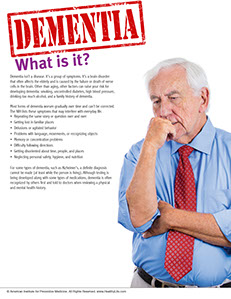SYMPTOM CHECKER
CONDITIONS
Male
Female
Child
Arm, Hand & Shoulder Concerns
Legs & Feet Concerns
Dental & Mouth Concerns
Ear & Nose
Eye Conditions
Head Conditions
Arm, Hand & Shoulder Concerns
Legs & Feet Concerns
Front
Back
Arm, Hand & Shoulder Concerns
Dental & Mouth Concerns
Ear & Nose
Eye Conditions
Head Conditions
Arm, Hand & Shoulder Concerns
Dental & Mouth Concerns
Ear & Nose
Eye Conditions
Head Conditions
Front
Back
Arm, Hand & Shoulder Concerns
Neck Links
Head & Neck Concerns
Arm, Hand & Shoulder Concerns
Neck Links
Head & Neck Concerns
Front
Back
Online Clinic
Wise Healthcare
Dementia - What is it?

Print on Demand
Dementia isn’t a disease. It’s a group of symptoms. It’s a brain disorder that often affects the elderly and is caused by the failure or death of nerve cells in the brain. Other than aging, other factors can raise your risk for developing dementia: smoking, uncontrolled diabetes, high blood pressure, drinking too much alcohol, and a family history of dementia.
Most forms of dementia worsen gradually over time and can’t be corrected. The NIH lists these symptoms that may interfere with everyday life.
• Repeating the same story or question over and over
• Getting lost in familiar places
• Delusions or agitated behavior
• Problems with language, movements, or recognizing objects
• Memory or concentration problems
• Difficulty following directions
• Getting disoriented about time, people, and places
• Neglecting personal safety, hygiene, and nutrition
For some types of dementia, such as Alzheimer’s, a definite diagnosis cannot be made (at least while the person is living). Although testing is being developed along with some types of medications, dementia is often recognized by others first and told to doctors when reviewing a physical and mental health history.
This website is not meant to substitute for expert medical advice or treatment. Follow your doctor’s or health care provider’s advice if it differs from what is given in this guide.
The American Institute for Preventive Medicine (AIPM) is not responsible for the availability or content of external sites, nor does AIPM endorse them. Also, it is the responsibility of the user to examine the copyright and licensing restrictions of external pages and to secure all necessary permission.
The content on this website is proprietary. You may not modify, copy, reproduce, republish, upload, post, transmit, or distribute, in any manner, the material on the website without the written permission of AIPM.
2021 © American Institute for Preventive Medicine - All Rights Reserved. Disclaimer | www.HealthyLife.com















































